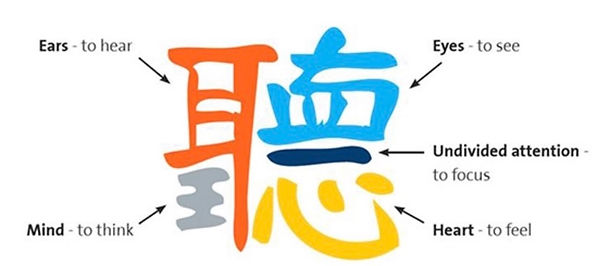
"Listen With Curiosity.
Speak With Honesty.
Act With Integrity"
- Roy T. Bennett
Honesty
When it comes to the personal philosophy of Thinking Before You Speak, honesty plays a very significant role. When you speak, you want to do it with honest intentions. To do this, it is essential to make an effort to engage in active and honest listening while conversing with the people around you in order to get the most out of the interactions. It is said that one of the highest and most effective levels of listening is active listening. However, this special communication skill requires practice. It is also an excellent strategy for having communication that is clear and concise. It is mainly based on paying undivided attention to what the other person is saying, listening carefully while showing interest, and not interrupting at any point in the conversation (Jahromi et al. 2016).
Doing this will then help you connect with others and aid in building an honest and thoughtful response, one with meaning and truth (which is another tenet I discuss).
How many times have you been in a conversation, and you choose to just go along with what they say? Saying things like "mhm" or "yeah," when really you lost them 20 minutes ago and honestly don't know where the conversation is headed.
Or how about the loss of eye contact? Sometimes your eyes stray, perhaps because you're focused on the dog in the background fetching a ball, or you cant stop veering your attention to the beat of your favorite song in the background. These are only a few examples of situations I've been in once or twice and that I'm working towards avoiding.
Please take note of how I say I am working towards this; keep in mind that growth takes time, and the practice of actively and honestly listening does not come all at once.
When you choose to actively and honestly listen, you are listening not only with your ears but also with your mind, eyes, undivided attention, and your heart. This, my friend, is the most honest way of listening…

Fig 1. The Chinese symbol for listen shown above (Brighton, 2020).
The Chinese symbol for "listen" symbolizes these crucial components of honest listening that go beyond simply hearing.
As you can see in Figure 1, the simple word for ear, which you will use to hear with, can be found on the left-hand side of the image. The word eye, which can be found on the right-hand side of the image, indicates that you see your person clearly and feel them with your heart, providing them with your full and undivided attention while listening fully and completely (Brighton, 2020).
This symbol represents honest listening because it gets to the heart of WHY you are listening. People frequently listen because someone is speaking rather than with their ears, eyes, undivided attention, and heart (Brighton, 2020). Doing this can result in increased clarity, healthier relationships, accurate information, and respect (Brighton, 2020).
Further Research
Numerous studies have also shown that active listening can result in positive outcomes.
One study done by Christopher Gearhart and Graham Brodie, from the Department of Communication Studies, at Louisiana State University indicated higher scores on the Active Empathic Listening scale (AEL), a type of listening identified as being particularly important in close relationships and associated contexts such as supportive episodes (Gearhart & Bodie, 2011). Which happened to correlate positively with Ronald Riggio's and Rebecca Reichard's research (2005) components of social responsiveness, expression, emotional sensitivity, and social control, all of which are linked to a variety of positive interplay and relationship outcomes (Riggio & Reichard, 2008). Riggio's work establishes a framework for emotional and social skills to show their role in leadership and how they relate to emotional and social intellects (Riggio & Reichard, 2008).
Other research has also shown that active listening will help you gain more information from the people around you, increase trust, reduce hate, better understand how to motivate others, and stimulate a higher level of dedication in the people you spend your time with (Jahromi et al., 2016).

What can I take from this?
No one expects you to go out and become a master of listening actively and honestly or apply this to your entire life; instead, I encourage you to simply think about it and try it with a friend, family member, or even a stranger you meet.
Give them your full, honest, and active attention. Remember, listen with more than your ears; by doing so, you may discover that this not only helps you but also those in your life and all around you. Whether at home, in a workplace, or simply out and about.